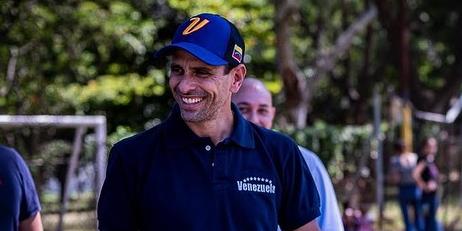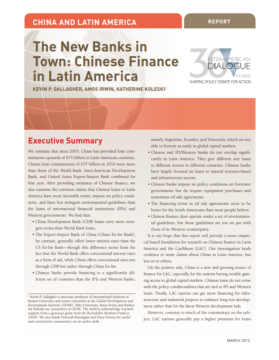Hugo Stay Home
Hugo Chavez, the Venezuelan president, has clearly been enticed by the Libyan drama, where his longtime friend and ally, Muammar al-Qaddafi, is under siege from rebel forces.
A Daily Publication of The Dialogue
Venezuelan opposition figure Henrique Capriles, who unsuccessfully ran twice against President Nicolás Maduro, has said he would support congressional elections scheduled for December, a break from National Assembly President and opposition leader Juan Guaidó, who has vowed to boycott the vote citing concerns that Maduro’s government will rig it in its favor. Capriles’ announcement came days after Maduro’s government said it would pardon more than 100 imprisoned and exiled political opponents. What will result from Capriles’ break from the Guaidó-led faction of the opposition? What are the reasons behind Maduro’s decision to pardon political rivals? Should the opposition participate in the legislative vote, and does it stand a chance at victory if it remains divided?
Betilde Muñoz-Pogossian, director of the Department of Social Inclusion at the Organization of American States: “Venezuelans are once again faced with the dilemma of whether to participate in elections. A democratic election requires that it be fair, free and competitive. None of these standards are met in the case of Venezuela’s Dec. 6 elections. If we add the effects of gasoline shortages, hyperinflation and Covid-19 on the organization and administration of elections, the situation becomes even more severe. The critical issue is that participating in an electoral process that everyone knows will not meet the minimum standards for democratic elections means being functional to the Maduro regime, and the opposition cannot afford it. When it comes to releasing political prisoners, we must all support Capriles and others’ discussions on their behalf. However, we must draw a line on the issue of elections. Venezuela is not in a position to hold democratic elections, and while Capriles’ intentions to change the game and bring about a change in the dynamics to break out of the current political inertia are commendable, those conditions must still be met. We should wait to see how he will play the cards to turn this around, but it may be a dangerous game that could bring the country back into the political inertia he was trying to get it out of. Indeed, if Capriles fails in changing the game, Maduro will consolidate his stay in power, weakening the democratic forces in the restoration of democracy for Venezuela.”
Alejandro Velasco, associate professor at New York University: “A new opposition split should surprise no one: for as long as chavismo has been in power, unity has bedeviled Venezuela’s fractious and diverse anti-chavista coalition. More surprising is that it took this long. Guaidó’s strategy was always high-risk and time-bound, premised on quick results and founded on faulty assumptions about Maduro’s strengths and weaknesses. As Guaidó’s strategy grew increasingly stale, erratic and desperate, it was a matter of time before his internal support splintered. Yet this latest break is remarkable because it presumes an existential struggle in the opposition. Guaidó’s legal legitimacy rests on his leadership of the National Assembly, whose mandate expires in January. But the opposition’s moral legitimacy rests on its adherence to democratic values. By indicating that he intends to remain interim president indefinitely, Guaidó risks sacrificing both legal and moral legitimacy. Capriles’ move should be understood in this light: as a bid to reclaim democratic legitimacy against authoritarian rule. But it is a move fraught with risk, and he faces two key challenges. One is redefining ‘victory’ to mean not just Maduro’s ouster, but laying the groundwork for doing so democratically. The opposition will likely lose elections. But seeing them as one step in a longer struggle may articulate support for future bids and bolster its democratic credentials, a strategy that brought Capriles to within two points of the presidency in 2013 and won the opposition control of parliament in 2015. The second challenge is holding the line against Maduro. Like many autocrats, Maduro craves both power and a semblance of legitimacy. Pardoning rivals signaled–especially to the European Union–that he is willing to make some concessions in the pursuit of some legitimacy via elections. But Capriles must push for more and be prepared to pull out if Maduro refuses. Otherwise, the opposition will be left without eggs or the basket, and Venezuelans will be left with no one to turn to.”
Jesús Seguías, president of Venezuelan pollster DatinCorp: “What the opposition must do is discuss the definitive route that Venezuelans (not just the opposition) must take to overcome the mega-crises that are shaking the nation. When they do so, analyzing the scenario objectively and without ‘magical realism,’ they will have to rule out the insurrectionary and military route as unfeasible. Then, they will discover that the imperfect electoral route is the most ‘perfect’ of all—it is less expensive and more secure. Venezuelans must overcome the strategy of futile confrontation and begin to rehearse a new dimension of politics based on consensus and democratic tolerance. There is no other way. Undoubtedly, this rupture in the opposition is the logical consequence of the failure of the insurrectionary and military route that the opposition established seven years ago. Today, the opposition is nowhere. And the country is worse off—total chaos. Some leaders dared to break the rules and decided to explore new paths. That is the new scenario to which Capriles belongs, while the rest are still clinging to the impossible. Maduro is acting with great pragmatism in the face of the huge crisis he faces (and without real possibilities of success). He needs to free the game that was blocked by the severe sanctions of the international community, especially the United States. Maduro wants to win the sympathy or neutrality of Europe and isolate the Trump administration. He needs to legitimize a new parliament, removing Guaidó and Leopoldo López from the game.”
Maria Velez de Berliner, managing director of RTG-Red Team Group, Inc.: “Maduro’s pardon is nothing more than an effort to continue undermining the opposition. Capriles demonstrated twice that he had the capacity to unseat Maduro had those elections been fraud-free. Whether Capriles and his followers could succeed in December’s parliamentary elections remains to be seen. However, Capriles’ and María Corina Machado’s defection from Guaidó’s opposition-created ‘government in waiting’ confirms the historical fractiousness and divisiveness of Venezuela’s opposition, which Guaidó failed to overcome. His failure makes it clear that Guaidó lacks the capacity and countrywide support to unite and lead Venezuela in its dire conditions of today; conditions that will remain for years to come because Maduro has ample support among those he and his regime favor. Moreover, Maduro’s supporters will not leave power quietly or peacefully. Venezuela’s opposition already learned that electoral abstention is not a winning strategy. But the divided opposition does not stand a chance against the fraudulent shenanigans of Maduro and his acolytes. The opposition needs to close ranks around Capriles against Maduro, even if Capriles loses. By losing, the opposition will further corroborate the fraudulence of Maduro’s regime and begin making effective inroads toward the presidential election, when it comes. If Guaidó thought Capriles, Machado, his mentor Leopoldo López, Antonio Ledezma and others who put life and limb on the line to depose Chávez and Maduro were going to let Guaidó jump to the front of the presidential succession line, he was sadly misinformed. That misinformation contributed, along with the fractured opposition, to keeping Maduro in power to the detriment of suffering Venezuelans and the dismay of opposition supporters.”
 The Latin America Advisor features Q&A from leaders in politics, economics, and finance every business day. It is available to members of the Dialogue’s Corporate Program and others by subscription.
The Latin America Advisor features Q&A from leaders in politics, economics, and finance every business day. It is available to members of the Dialogue’s Corporate Program and others by subscription.
Hugo Chavez, the Venezuelan president, has clearly been enticed by the Libyan drama, where his longtime friend and ally, Muammar al-Qaddafi, is under siege from rebel forces.
Estimates of the volume, composition, and characteristics of Chinese lending to the region since 2005.
What will be the most important issues of the Venezuelan race? Is the election likely to be free and fair?
 Venezuelan opposition leader Henrique Capriles, pictured last December, said he would support participation in the December legislative elections in a split from opposition leader Juan Guaidó. // File Photo: Facebook page of Henrique Capriles.
Venezuelan opposition leader Henrique Capriles, pictured last December, said he would support participation in the December legislative elections in a split from opposition leader Juan Guaidó. // File Photo: Facebook page of Henrique Capriles.
